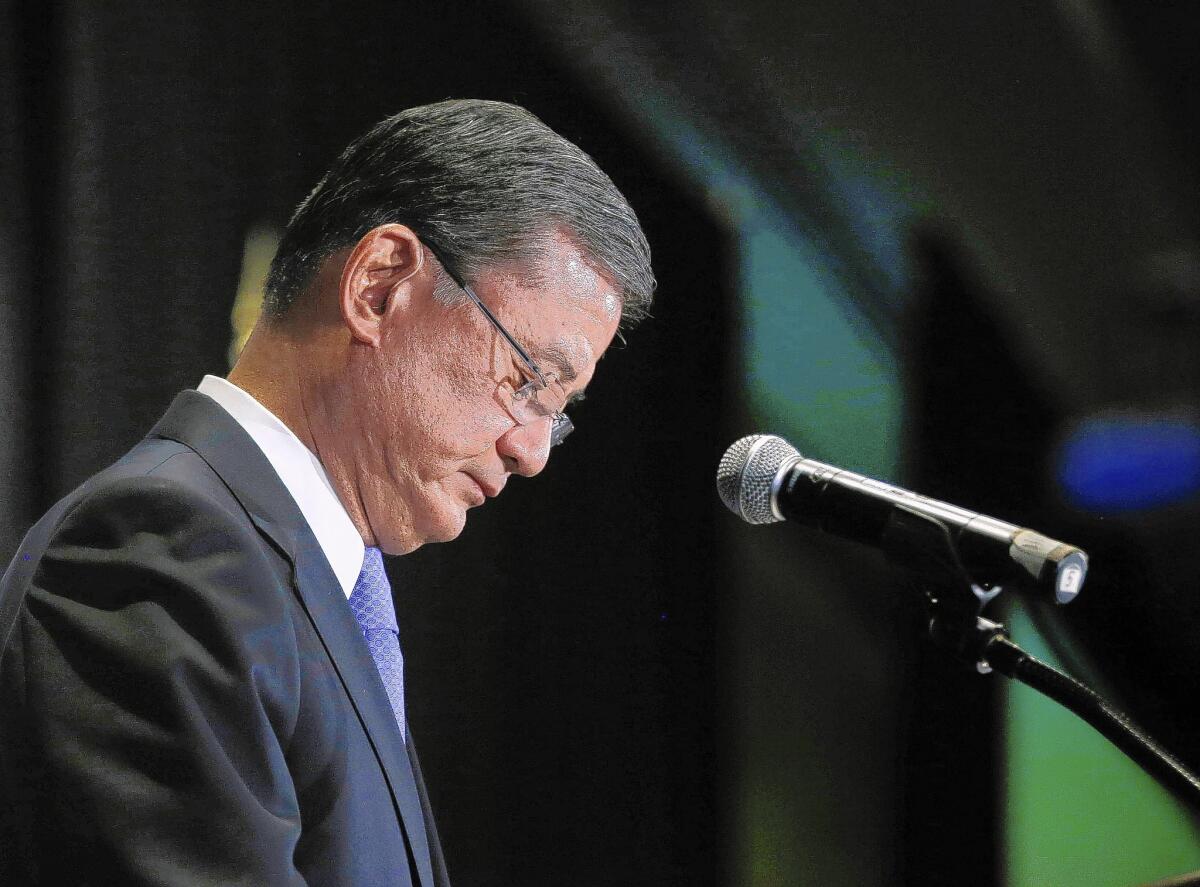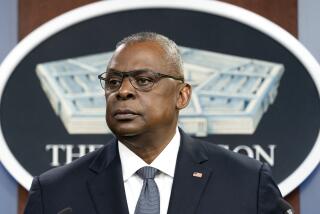VA chief and White House spokesman resign, fueling unease

Reporting from Washington — President Obama sought to stem a growing political furor Friday by accepting the resignation of Eric K. Shinseki, the beleaguered secretary of Veterans Affairs, the second Cabinet-level official to resign under fire this year.
Two hours later, Obama abruptly returned to the White House briefing room’s podium to announce the departure of what he called “one of my closest friends,” Jay Carney, the White House press secretary.
Although the resignations were unrelated, the sudden high-level reshuffle fueled a sense of unease in the West Wing. The administration plans to unveil new rules Monday to curtail power plant emissions, a move sure to spark opposition in coal-dependent states, and the president then is to leave for Europe to reassure allies nervous about Russia’s aggression in Ukraine.
The chief focus Friday was the upheaval in the Department of Veterans Affairs, where a growing scandal has focused on allegations that staffers in numerous VA facilities falsified records to conceal how long veterans had to wait for medical appointments.
Obama did not name a replacement for Shinseki, a retired four-star Army general who had been under intense pressure to step down.
The next VA secretary will face enormous challenges to repair a system that has been plagued with service delays since at least 2005 and that now is struggling with a flood of claims from veterans of the wars in Iraq and Afghanistan.
A White House official acknowledged Friday that the staff was in scramble mode to get to the “ground truth” of what happened at the VA and to develop a fix-it plan.
The president accepted Shinseki’s resignation hours after the 38-year military veteran had publicly apologized and accepted responsibility for the scandal. Shinseki’s deputy, Sloan Gibson, 61, a West Point graduate and former banker, will take over as acting secretary.
Obama praised Shinseki repeatedly, asserting over and over that he was persuaded by Shinseki’s own analysis that the VA chief was too much of a distraction to remain in the job.
“We don’t have time for distractions,” Obama said. “We need to fix the problem.
“What I want is somebody at the VA who is not spending time outside of solving problems for veterans,” he added. “That’s what I want somebody at the VA focused on. Not how they are getting second-guessed, and speculation about their futures.”
Shinseki’s departure is unlikely to end the political uproar over mismanagement of one of the federal government’s largest departments. The VA operates 1,700 hospitals and clinics handled 85 million outpatient visits last year.
Unlike most issues on Capitol Hill, the VA scandal has sparked bipartisan outrage, with both Democrats and Republicans viewing veterans as a core responsibility and a crucial constituency.
Congress plans to hold more oversight hearings into the still-unfolding scandal. Battles are shaping up in Congress over the VA budget and a spate of reform legislation.
Richard J. Griffin, the acting VA inspector general who issued a scathing report Wednesday, is continuing his investigation at 42 medical facilities. His full report is due in August.
On Friday, the VA released an audit saying 13% of the scheduling staffers interviewed indicated they had gotten instructions to change appointment dates.
In some cases, “pressures were placed on schedulers to utilize inappropriate practices in order to make waiting times appear more favorable,” the audit said.
Carney, a familiar face on TV from countless White House briefings, said he would leave this summer after three years in the job, longer than most White House press secretaries last. He will be replaced by his deputy, Josh Earnest.
Carney gave no reason for leaving other than to say he told the president last month that he was ready to move on. The West Wing wanted to make the news public before Obama leaves Monday for Poland, Belgium and France, and Earnest takes Carney’s place on the president’s plane.
Obama praised Earnest, calling him a man whose “name describes his demeanor.” The Kansas City, Mo., native worked on Capitol Hill before joining Obama’s 2008 presidential campaign.
The president’s decision to accept Shinseki’s resignation was at odds with his record of standing by Cabinet officials when controversy swirls around their departments.
Last fall, he refused to accept the resignation of Health and Human Services Secretary Kathleen Sebelius when HealthCare.gov, the portal to his new health insurance marketplaces, failed disastrously.
She helped fix the website and other obstacles before he accepted her resignation in April, six months after the crisis erupted.
But the chorus of Sebelius critics was mostly Republican. And as the VA mess unfolded publicly, Democrats who are worried about reelection in November joined GOP members of Congress in calling for Shinseki’s ouster.
Congressional Republicans and veterans groups vowed to keep the pressure on Obama.
“Today’s announcement really changes nothing,” said House Speaker John A. Boehner (R-Ohio). “We’ll hold the president accountable until he makes things right.”
“Republicans won’t let this story go,” Princeton University historian Julian E. Zelizer said. “Shinseki is also just one part of the story. The real issue is the state of the VA and the kind of activities that have been revealed. Those have not been fixed, and more stories can emerge.”
The VA scandal had become another headache for Democrats that, on the heels of the flawed rollout of the healthcare law, played into Republican claims that Obama’s party was incapable of governing effectively.
The issue has dogged Democratic candidates from states with large veteran populations, such as North Carolina Sen. Kay Hagan. But many Democrats in tough races jumped at the opportunity to call for Shinseki’s resignation as a way of demonstrating independence from the White House.
Even after Shinseki’s resignation, House Republicans assailed Senate Democratic leaders for not acting on a House-approved bill that would expand the VA secretary’s authority to fire or demote senior staffers for poor performance.
Republicans in the Senate, which can confirm or reject Obama’s nominee for VA secretary, are gearing up for a confrontation with the president as the midterm election season heats up.
“We need a fresh perspective and a leader who is willing to shake up the VA’s bureaucratic culture,” said Sen. Jerry Moran (R-Kan.), a member of the Senate Veterans’ Affairs Committee.
“I don’t see a new secretary being nominated and approved any time soon,” said Garry Augustine, executive director of the Disabled American Veterans’ Washington office.
Veterans groups welcomed Shinseki’s departure but said they wanted more action to fix the problems at VA facilities.
“There is a major challenge ahead for the administration and the VA to restore our veterans’ faith in the VA system,” said Dan Dellinger, national commander of the 2.4-million-member American Legion, who had called for Shinseki’s ouster.
He said that the administration must ensure that “those responsible for the current state of affairs are properly disciplined” and that the VA “moves swiftly to see that our veterans are seen in a timely manner and given the best care possible.”
Earlier on Friday, Shinseki announced plans to remove the senior leadership from the VA facility in Phoenix. He also ordered staff to contact each of the 1,700 veterans kept off a waiting list for an appointment at the Phoenix VA and arrange for their care.
“I was too trusting of some,” Shinseki said in a speech to the National Coalition for Homeless Veterans. “I can’t explain the lack of integrity among some of the leaders of our healthcare facilities. This is something I rarely encountered during 38 years in uniform.”
In a farewell message to VA employees, Shinseki said his “personal and professional commitment and my loyalty to veterans, their families and our survivors was the driving force” behind his decision to resign.
“Over the course of the last 5 1/2 years, you have made significant and lasting progress in expanding access for veterans, in significantly decreasing the backlog in veterans’ claims while building the system that will end the backlog in 2015, and in bringing an end to veterans’ homelessness,” he said. “We have come a long way together in bringing this department into the 21st century in ways that will serve veterans well into the future.”
More to Read
Sign up for Essential California
The most important California stories and recommendations in your inbox every morning.
You may occasionally receive promotional content from the Los Angeles Times.













